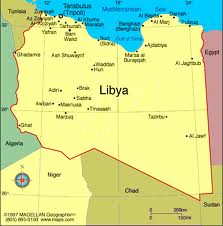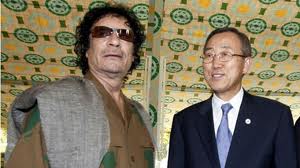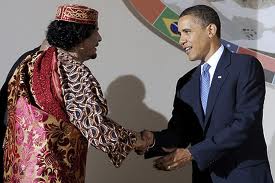The record of military intervention during the last several decades is one of almost unbroken failure if either the human costs or political outcomes are taken into proper account.
By Richard Falk
 What is immediately striking about the bipartisan call in Washington for a no-fly zone and air strikes designed to help rebel forces in Libya is the absence of any concern with the relevance of international law or the authority of the United Nations. None in authority take the trouble to construct some kind of legal rationalization. The ‘realists’ in command, and echoed by the mainstream media, do not feel any need to provide even a legal fig leaf before embarking on aggressive warfare.
What is immediately striking about the bipartisan call in Washington for a no-fly zone and air strikes designed to help rebel forces in Libya is the absence of any concern with the relevance of international law or the authority of the United Nations. None in authority take the trouble to construct some kind of legal rationalization. The ‘realists’ in command, and echoed by the mainstream media, do not feel any need to provide even a legal fig leaf before embarking on aggressive warfare.
 It should be obvious that a no-fly zone in Libyan airspace is an act of war, as would be, of course, contemplated air strikes on fortifications of the Qadaffi forces. The core legal obligation of the UN Charter requires member states to refrain from any use of force unless it can be justified as self-defense after a cross-border armed attack or mandated by a decision of the UN Security Council. Neither of these conditions authorizing a legal use of force is remotely present, and yet the discussion proceeds in the media and Washington circles as if the only questions worth discussing pertain to feasibility, costs, risks, and a possible backlash in the Arab world. The imperial mentality is not inclined to discuss the question of legality, much less show behavioral respect for the constraints embedded in international law.
It should be obvious that a no-fly zone in Libyan airspace is an act of war, as would be, of course, contemplated air strikes on fortifications of the Qadaffi forces. The core legal obligation of the UN Charter requires member states to refrain from any use of force unless it can be justified as self-defense after a cross-border armed attack or mandated by a decision of the UN Security Council. Neither of these conditions authorizing a legal use of force is remotely present, and yet the discussion proceeds in the media and Washington circles as if the only questions worth discussing pertain to feasibility, costs, risks, and a possible backlash in the Arab world. The imperial mentality is not inclined to discuss the question of legality, much less show behavioral respect for the constraints embedded in international law.
 Cannot it not be argued that in situations of humanitarian emergency ‘a state of exception’ exists allowing an intervention to be carried out by a coalition of the willing provided it doesn’t make the situation worse? Was not this the essential moral/political rationale for NATO’s Kosovo War in 1999, and didn’t that probably spare the majority Albanian population in Kosovo from a bloody episode of ethnic cleansing at the hands of the embattled Serb occupiers? Hard cases make bad precedents, as is well known. But even bad precedents need to find a justification in the circumstances of a new claimed situation of claimed exception, or else there would a strong reinforcement for the public impression that the powerful act as they will without even pausing to make a principled argument for a proposed departure from the normal legal regime of restraint.
Cannot it not be argued that in situations of humanitarian emergency ‘a state of exception’ exists allowing an intervention to be carried out by a coalition of the willing provided it doesn’t make the situation worse? Was not this the essential moral/political rationale for NATO’s Kosovo War in 1999, and didn’t that probably spare the majority Albanian population in Kosovo from a bloody episode of ethnic cleansing at the hands of the embattled Serb occupiers? Hard cases make bad precedents, as is well known. But even bad precedents need to find a justification in the circumstances of a new claimed situation of claimed exception, or else there would a strong reinforcement for the public impression that the powerful act as they will without even pausing to make a principled argument for a proposed departure from the normal legal regime of restraint.
 With respect to Libya, we need to take account of the fact that the Qaddafi government, however distasteful on humanitarian grounds, remains the lawful diplomatic representative of a sovereign state, and any international use of force even by the UN, much less a state or group of states, would constitute an unlawful intervention in the internal affairs of a sovereign state, prohibited by Article 2(7) of the UN Charter unless expressly authorized by the Security Council as essential for the sake of international peace and security. Beyond this, there is no assurance that an intervention, if undertaken, would lessen the suffering of the Libyan people or bring to power a regime more respectful of human rights and dedicated to democratic participation.
With respect to Libya, we need to take account of the fact that the Qaddafi government, however distasteful on humanitarian grounds, remains the lawful diplomatic representative of a sovereign state, and any international use of force even by the UN, much less a state or group of states, would constitute an unlawful intervention in the internal affairs of a sovereign state, prohibited by Article 2(7) of the UN Charter unless expressly authorized by the Security Council as essential for the sake of international peace and security. Beyond this, there is no assurance that an intervention, if undertaken, would lessen the suffering of the Libyan people or bring to power a regime more respectful of human rights and dedicated to democratic participation.
The record of military intervention during the last several decades is one of almost unbroken failure if either the human costs or political outcomes are taken into proper account. Such interventionary experience in the Islamic world during the last fifty years makes it impossible to sustain the burden of persuasion that would be needed to justify an anti-regime intervention in Libya in some ethically and legally persuasive way.
 There are also serious credibility concerns. As has been widely noted in recent weeks, the United States has had no second thoughts about supporting oppressive regimes throughout the region for decades, and is widely resented for this role by the various anti-regime movements. Qadaffi’s crimes against humanity were never a secret, and certainly widely known by European and American intelligence services. Even high profile liberal intellectuals in Britain and the United States welcomed invitations to Tripoli during the last several years, apparently without a blink of conscience, accepting consulting fees and shamelessly writing positive assessments that praised the softening authoritarianism in Libya. Perhaps, that is what Joseph Nye, one of the most prominent of these recent good will visitors to Tripoli, would call a private use of ‘smart power,’ commending Qadaffi for renouncing his anti-West posture, for making deals for oil and weapons, and most of all for abandoning what some now say was at most a phantom nuclear weapons program.
There are also serious credibility concerns. As has been widely noted in recent weeks, the United States has had no second thoughts about supporting oppressive regimes throughout the region for decades, and is widely resented for this role by the various anti-regime movements. Qadaffi’s crimes against humanity were never a secret, and certainly widely known by European and American intelligence services. Even high profile liberal intellectuals in Britain and the United States welcomed invitations to Tripoli during the last several years, apparently without a blink of conscience, accepting consulting fees and shamelessly writing positive assessments that praised the softening authoritarianism in Libya. Perhaps, that is what Joseph Nye, one of the most prominent of these recent good will visitors to Tripoli, would call a private use of ‘smart power,’ commending Qadaffi for renouncing his anti-West posture, for making deals for oil and weapons, and most of all for abandoning what some now say was at most a phantom nuclear weapons program.
 Some Beltway pundits are insisting on talk shows that the interventionists after faltering in the region want to get on the right side of history before it is too late. But what is the right side of history in Libya seems quite different than it is in Bahrain or Jordan, and for that matter throughout the region. History seems to flow according to the same river currents as does oil! Elsewhere, the effort is to restore stability with minimal concessions to the reformist demands, hoping to get away with a political touch up that is designed to convert the insurrectionists of yesterday into the bureaucrats of tomorrow.
Some Beltway pundits are insisting on talk shows that the interventionists after faltering in the region want to get on the right side of history before it is too late. But what is the right side of history in Libya seems quite different than it is in Bahrain or Jordan, and for that matter throughout the region. History seems to flow according to the same river currents as does oil! Elsewhere, the effort is to restore stability with minimal concessions to the reformist demands, hoping to get away with a political touch up that is designed to convert the insurrectionists of yesterday into the bureaucrats of tomorrow.
Mahmoud Mamdani has taught us to distinguish ‘good Muslims’ from ‘bad Muslims,’ now we are being instructed to distinguish ‘good autocrats’ from ‘bad autocrats.’ By this definition, only the pro-regime elements in Libya and Iran qualify as bad autocrats, and their structures of must at least be shaken if they cannot be broken. What distinguishes these regimes? It does not seem to be that their degree of oppressiveness is more pervasive and severe than is the case for the others. Other considerations give more insight: access and pricing of oil, arms sales, security of Israel, relationship to the neoliberal world economy.
What I find most disturbing is that despite the failures of counterinsurgency thinking and practice, American foreign policy gurus continue to contemplate intervention in post-colonial societies without scruples or the slightest show of sensitivity to historical experience, not even the recognition that national resistance in the post-colonial world has consistently neutralized the advantages of superior hard power deployed by the intervening power. The most that has been heard is a whispered expression of concern by the relatively circumspect Secretary of Defense, Robert Gates, that it may not be prudent at this time for the United States to intervene in yet another Islamic country. The absence of any learning from Vietnam, Afghanistan, and Iraq is startling, underscored by the glorification of General David Petraeus who rose to military stardom soon after he was credited with refurbishing the army’s approach to counterinsurgency, which is the Pentagon jargon for pro-regime intervention. Major current illustrations are Afghanistan, Iraq, and several other places in the Middle East. Technically speaking, the proposed intervention in Libya is not an instance of counterinsurgency, but is rather a pro-insurgency intervention, as has also been the case with the covert destabilization efforts that continue in Iran.
It is easier to understand the professional resistance to learning from past failure on the part of military commanders as it is their life work, but the civilian politicians deserve not a whit of sympathy. Among the most ardent advocates of intervention in Libya are the last Republican presidential candidate, John McCain, the supposedly independent Joe Lieberman, and the Obama Democrat John Kerry. It seems that many of the Republicans focused on the deficit although cutting public expenditures punishes the poor at a time of widespread unemployment and home foreclosures would not mind ponying up countless billions to finance acts of war in Libya. There exists a worrying readiness to throw money and weapons at an overseas conflict, seemingly as to show that imperial geopolitics is not yet dead despite the growing evidence of American decline.
In the end, I suppose we have to hope that those more cautious imperial voices that base their opposition to intervention on feasibility concerns carry the day!
What I am mainly decrying here in the Libyan debate are three kinds of policy failure:
(1) the exclusion of international law and the United Nations from relevance to national debates about international uses of force;
(2) the absence of respect for the dynamics of self-determination in societies of the South;
(3) the refusal to heed the ethics and politics appropriate for a post-colonial world order that is being de-Westernized and is becoming increasingly multi-polar.
A SHORT POSTSCRIPT TO “WILL WE EVER LEARN? CONTRA INTERVENTION”
Since my blog was posted several responses and developments lead me to think further about the essential issues, but not to change course.
It has been suggested that, perhaps, a no fly zone would enable the rebel forces to deal more effectively with the foreign militias being relied upon by the Qaddafi regime to do much of its dirty work. It is difficult to know how a particular version of the no fly zone would impact on the battlefield. We are
speculating on the basis of radical uncertainty, and in such circumstances, it is almost always better to refrain from coercive action than to engage in it. Furthermore, there is a wide spectra of no fly zone scenarios depending on the governments who are taking such an initiative, its degree of dependence on correlated air strikes, and the options available to the rebels and Qaddafi to either take advantage of its effect or to circumvent them. For instance, it is politically more palatable to have a no fly zone established and administered under the auspices of the Arab League or as has been proposed, a joint Egypt/Turkey undertaking than to have it done by NATO or a United States-led ‘coalition of the willing.’ The UN as sponsor is out of the question given Russian opposition, and Chinese reluctance. At the same time, given the logistical and technological demands, it is more likely that the effectiveness of a no fly zone would be greater under NATO/U.S control. A failed no fly zone would embolden Libya, and likely improve his prospects to prevail in the internal struggle.
Furthermore, the tactics and character of the rebel movement seems dramatically different than the uprisings elsewhere in the region, particularly in Egypt and Tunisia. In Libya, the movement lacks the inspiring quality of nonviolence, human solidarity, and social/political demands for justice. It was violent from the outset, tribalist in spirit, recipient of weaponry from external actors, preoccupied with control over the oil-producing areas, indistinct in political outlook (a rebel segment flying the pre-Qaddafi flag of the Libyan monarchy), and uncertainly linked to private sector international oil interests. This looks more like a struggle for control of the state or possibly an effort to establish a secessionist second state if a stalemate emerges. Under this mix of circumstances one must be suspicious about the focus on Libya and the call for full consideration of military options. It would seem to be the case that if feasibility hurdles could be overcome, the political climate in the United States and Britain would support a large-scale intervention, possibly with Arab regional acquiescence. See illuminating analysis by Michel Chossudovsky, “Insurrection and Military Intervention: The US-NATO Attempted Coup d’Etat in Libya?” www.globalresearch.ca March 8, 2011.
With these considerations in mind, I think the case for nonintervention remains overwhelmingly persuasive from moral, legal, and political perspectives. Perhaps, the most compelling rationale for reaching such a conclusion was well stated by Roger Cohen: “But the deepest reason is the moral bankruptcy of the West with respect to the Arab world. Arabs have no need of U.S. or European soldiers as they seek the freedom that America and the European Union were content to deny them.” (NY Times, March 7, 2011) It is not often that I have the opportunity to quote approvingly from the New York Times when the subject-matter involves the Middle East, and so I want to make the most of it.
Perhaps, there is another way to exhibit the shabbiness of the argument being made on behalf of a protective no fly zone. Why no comparable proposal on behalf of the civilian population of Gaza trapped behind a merciless blockade for more than three years?
Aside from issues of nonintervention, always important, there is here the paramount relevance of support for dynamics of self-determination. This does not assure the triumph of justice in conflict situations. Qaddafi may win or the rebels may prevail, and prove as distastefully oppressive as the Qaddafi regime. On balance, what means most in the 21st century is to allow the peoples of the world make their own history. Western military paternalism and economic exploitation have been deservedly discredited.
As suggested, there is no way to seal the borders of territorial states. Neither pure noninterventionism nor insulated self-determination are ever possible given the porousness of borders and the interventionary incentives of a range of outsiders. There are various low profile ‘interventions’ taking place. Weapons are being supplied, perhaps, special forces are covertly present as advisors or even fighters. In this respect, the most that can be done is to oppose gross forms of overt governmental intervention, as well as limit assistance to governments, including the Tripoli regime, that violate the fundamental human rights of their own people. In this respect, sanctions are appropriate if authorized by the UN so long as not coupled with intervention, and take responsible account of competing moral, legal, and political claims.
Keep in mind that Libya has over 3.5% of the world’s oil reserves, which is twice the amount present in the United States. Without being an economic determinist, oil certainly helps explain the preferential treatment being given to insurrection in Libya!
Richard Falk , Professor Emeritus of International Law at Princeton University is also author of Explorations of the Edge of Time: Prospects for a New World Order – Crimes of War: Iraq and The Costs of War: International Law, the UN, and World Order After Iraq. He is the current UN’s Special Rapporteur for Human Rights in the Occupied Palestinian Territories. This post first appeared on his Blog.
Read More
RICHARD FALK : What is Winning? The Next Phase for the Revolutionary Uprisings
RICHARD FALK : How Honest is the Honest Broker?
ATTENTION READERS
We See The World From All Sides and Want YOU To Be Fully InformedIn fact, intentional disinformation is a disgraceful scourge in media today. So to assuage any possible errant incorrect information posted herein, we strongly encourage you to seek corroboration from other non-VT sources before forming an educated opinion.
About VT - Policies & Disclosures - Comment Policy



